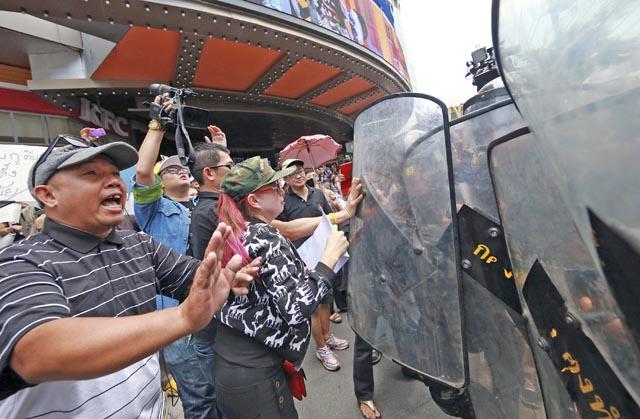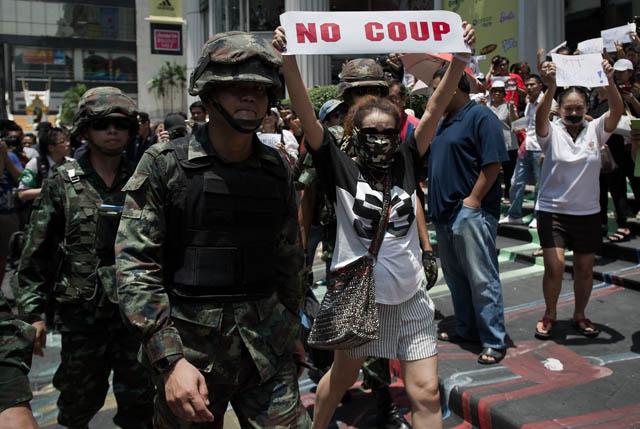You are here
Ex-Thai PM to be held for a week; senate dissolved
By AP - May 24,2014 - Last updated at May 24,2014

BANGKOK — Thailand’s coup leaders said Saturday that they would keep former prime minister Yingluck Shinawatra, Cabinet members and anti-government protest leaders detained for up to a week to give them “time to think” and to keep the country calm.
Outspoken academics were also summoned to report to the junta.
The ruling military council also dissolved the country’s senate on Saturday, stripping away the last democratic institution in the country.
The moves appear aimed at consolidating power and preventing any high-profile figures from rallying opposition to the military, which seized power Thursday after months of sometimes violent street protests and deadlock between the elected government and protesters supported by Thailand’s elite establishment.
For a second day, hundreds of anti-coup protesters defied the military’s ban on large gatherings, shouting slogans and waving signs Saturday outside a Bangkok cinema before moving on to Victory Monument, a major city landmark several kilometres away.
The demonstrators briefly confronted rows of soldiers and police who were lined up with riot shields on a road leading to the monument, with a few scuffles breaking out before most of the protesters broke away.
They were later seen streaming onto the city’s Skytrain elevated transit system, apparently riding over police lines to the monument.
By late afternoon, about 500 demonstrators had gathered at Victory Monument. Army and police presence was low key.
Most of Bangkok, however, remained calm on Saturday, and there was little military presence on the streets.
Deputy army spokesperson, Col. Weerachon Sukondhapatipak, said that all those detained by the junta were being well-treated and that the aim of the military was to achieve a political compromise.
He said later that “at least 100” people were in military custody, but he could not provide exact numbers or names.
“This is in a bid for everybody who is involved in the conflict to calm down and have time to think,” Weerachon said. “We don’t intend to limit their freedom, but it is to relieve the pressure.”
The military leaders also summoned 35 other people, including more politicians, political activists and, for the first time, outspoken academics, to “maintain peace and order”. It was not immediately clear whether they would be detained.
One of those on the list, Kyoto University professor of Southeast Asian studies Pavin Chachavalpongpun, said by phone from Japan that he would not turn himself in. He said the summons meant the junta felt insecure.
“The military claiming to be a mediator in the Thai conflict, that is all just nonsense,” he said. “This is not about paving the way for reform and democratisation. We are really going back to the crudest form of authoritarianism.”
The junta announced in a televised statement Saturday evening that it would assume all lawmaking power and that the senate would be dissolved.
It had left the senate in place when it suspended the constitution and dissolved the lower house of parliament on Thursday, presumably in hopes that the upper house might later approve some of its measures and provide a vestige of democracy.
The reason for Saturday’s about-face was not known.
Several nations have condemned the coup. The United States, a key ally of Thailand, suspended $3.5 million in military aid on Friday, and recommended that Americans reconsider any non-essential travel to the Southeast Asian country.
The army says it launched the coup to prevent more turmoil after two days of peace talks in which neither political faction would agree to back down from its stance in the ongoing crisis.
It was the 12th time in eight decades that Thailand’s powerful military has seized power.
For months, anti-government protesters linked to Thailand’s royalist establishment had blocked streets in Bangkok, demanding that the government step down over allegations of corruption and ties to Yingluck’s brother, exiled former prime minister Thaksin Shinawatra, who was himself deposed in a 2006 military coup.
Populist parties affiliated with the Shinawatras have won every election since 2001 in Thailand. Thaksin still wields enormous influence over the country’s political affairs and remains at the heart of the ongoing crisis.
The protesters have been demanding that the government resign in favour of an unelected council, while the government said it was elected by a clear majority in 2010 and could not step down.
An election was held in February, but it was invalidated by a court after violence disrupted voting.
It was unclear Saturday exactly how many political leaders were being detained by the army.
Known to be among them were two former prime ministers: Yingluck, who was removed from office by a court earlier this month on nepotism charges, and her temporary replacement, Niwattumrong Boonsongpaisan.
Several Cabinet members as well as leaders of the anti-government protests have been held since Thursday’s coup.
UN High Commissioner for Human Rights Navi Pillay urged Thailand to “ensure respect for human rights and a prompt restoration of the rule of law in the country”.
Human rights groups, including Human Rights Watch and Amnesty International, criticised the detentions of political leaders.
Related Articles
Thailand’s ruling junta warned protesters it would not tolerate any further rallies against its coup after tense standoffs Sunday between soldiers and angry crowds, and said demonstrators would be held for one or two days, but could be jailed for up to two years if they kept taking to the streets.
A Thai court ordered Prime Minister Yingluck Shinawatra to step down on Wednesday after finding her guilty of abusing her power, prolonging a political crisis that has led to violent protests and brought the economy close to recession.
Thai anti-government protesters who have been camped out in north Bangkok packed their tents and marched downtown on Monday as they consolidated efforts to topple Prime Minister Yingluck Shinawatra, a day after a disrupted general election.


















